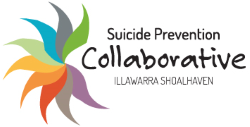Making someone feel as though they are not alone is one of the most powerful things a person can give.
Story by Natalie Croxon, Photo by Robert Peet, Illawarra Mercury.
It's something Emma Miles, service leader and peer worker at Safe Haven in Wollongong, has heard from someone who's used the service, a non-clinical alternative to the emergency department for anyone experiencing emotional or suicidal distress.
And showing people they are not alone is at the core of what Safe Haven does.
The service is staffed by peer workers: people who themselves have experienced distress or crisis.
Having people on hand who know what it's like is an approach used more and more to help those in suicidal distress.
Peer workers are also employed by the Illawarra Shoalhaven Local Health District (ISLHD), often working alongside and complementing the efforts of clinical staff.
Neil Fraser, a peer worker with the ISLHD's Suicide Prevention Outreach Team (SPOT), became involved in prevention work after his own crisis, realising that helping others helped him, too.
SPOT provides immediate community outreach to people experiencing a suicidal crisis, and Mr Fraser spoke of how different this was from what occurred even 10 years ago.
"You were expected to find services... Now it's much more about meeting community where they are," Mr Fraser said.
- You can find someone who will listen without judgement at Safe Haven (open 2-10pm Wed-Sat, 55 Urunga Parade, Wollongong), Lifeline (24/7, phone 13 11 14) or 13YARN (24/7, phone 13 92 76). The Suicide Prevention Outreach Team can be contacted by calling the NSW Mental Health Line on 1800 011 511.
At the time of his crisis, Mr Fraser said a peer worker was not something a person would come into contact with at the acute point of their distress.
But now it was recognised that a clinical environment like a hospital would often exacerbate distress, he said, and it was much more common now for people to be able to debrief with a peer worker, who would ensure they got the support that was right for them.
Mr Fraser said peer workers workers closely with clinicians, ensuring people had not only health supports available but social supports, too.
ISLHD director of mental health Adam Bryant said the health service saw peer work as a concurrent form of care that ran alongside clinical care.
Safe Haven is funded by NSW Health and operated by mental health service provider Stride, which co-designed the service with people with lived experience.
Ms Miles said peer workers offered people the ability to consider the power of being alive.
"What I find so moving in working there is that people will often reflect to us, 'I have never felt there was a sense of achievement in my story, or of strength, or of power'," she said.
At Safe Haven, peer workers are available to help people find the best options to alleviate their distress.
Ms Miles said that for some people, that might involve clinical help, and peer workers could assist in finding a psychologist or making an appointment with a GP for a mental health treatment plan.
For people who continue to find it difficult to regulate, peer workers might also encourage them to go to hospital and even accompany them there (Safe Haven is within walking distance of Wollongong Hospital).
Safe Haven is open to people of all ages, a Medicare card is not required, and the space offers a calm, non-judgemental and welcoming environment.
Mr Bryant said suicide prevention needed a coordinated approach that extended beyond the health system, something echoed by suicide prevention manager Pippa Stevenson.
"We know it's really important for the whole community to provide support, not just a health service," Ms Stevenson said.
Illawarra Shoalhaven Suicide Prevention Collaborative project manager Clare Leslie said one of the strongest predictors of a suicide attempt was a previous attempt, and while coordinated, compassionate care could reduce this risk, it did not always require clinical treatment.
"We know there are a range of effective clinical treatments that can support people in their recovery," Ms Leslie said.
"We also know that peer workers, who have experienced recovering from mental ill-health or suicidality, can provide a different level of understanding and may be a better fit for some people."
Help is a phone call away
Another non-clinical option is Lifeline, the charity providing free, 24/7 crisis support over the phone.
Daniel Iannuzzi is a crisis supporter with Lifeline South Coast, and urges people to call the service if they need support, even if they feel their problems are insignificant.
He said every person was just as important as the next.
"I think one thing that's really great to remember is that people call us, and can call us, for any reason," Mr Iannuzzi said.
As a crisis supporter he said he received calls from people in the deepest distress, and others who needed to check in with someone in order to get through a particular time of stress.
Lifeline South Coast chief executive officer Renee Green said suicide was a complex and individual issue, which was reflected in the calls volunteers took.
Members of the wider community can learn the skills to recognise signs of suicidal distress in others, ask them if they are feeling suicidal, and refer them to appropriate supports with QPR training.
The Mercury has partnered with the Illawarra Shoalhaven Suicide Prevention Collaborative - a group of more than 70 individuals, including representatives of 30 organisations - to offer the one-hour, online course free to 500 people.
- Support is available. Call Lifeline on 13 11 14 or the Suicide Call Back Service on 1300 659 467. For those who have lost a loved one by suicide, StandBy Support After Suicide (phone 1300 727 247) and Thirrili Indigenous Postvention Support (24/7, phone 1800 805 801).
